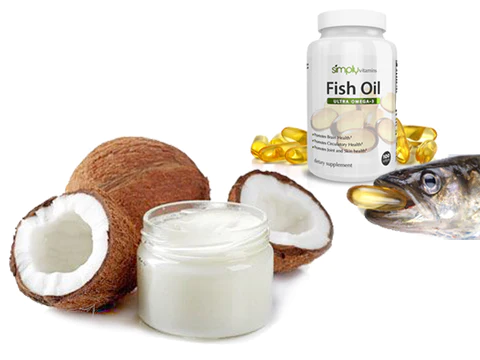Coconut oil and fish oil are two popular dietary supplements that are known for their health benefits. Both oils are rich in healthy fats, including omega-3 fatty acids, which are essential for maintaining good health. But which one is better for you? In this article, we will compare coconut oil vs fish oil and examine their respective benefits and drawbacks.
Coconut Oil:
Coconut oil is a tropical oil that is extracted from the meat of mature coconuts. It is known for its high content of medium-chain triglycerides (MCTs), which are a type of saturated fat that is metabolized differently than other types of fats. MCTs are broken down quickly in the liver and can be used for energy, making them a popular ingredient in ketogenic diets.
Coconut oil has a number of potential health benefits, including:
- Improving cholesterol levels: Studies have shown that coconut oil can help increase levels of HDL, or “good” cholesterol, while decreasing levels of LDL, or “bad” cholesterol.
- Boosting brain function: MCTs in coconut oil are thought to be beneficial for brain function and may help improve symptoms of Alzheimer’s disease.
- Supporting weight loss: Some studies suggest that coconut oil may help promote weight loss by increasing feelings of fullness and boosting metabolism.

Fish Oil:
Fish oil is a dietary supplement that is derived from the tissues of oily fish, such as salmon, sardines, and mackerel. It is a rich source of omega-3 fatty acids, which are important for a variety of bodily functions, including brain health, heart health, and inflammation.
Fish oil has a number of potential health benefits, including:
- Reducing inflammation: Omega-3 fatty acids in fish oil are known for their anti-inflammatory properties and may help reduce the risk of chronic diseases like arthritis, heart disease, and cancer.
- Supporting heart health: Fish oil may help reduce the risk of heart disease by lowering blood pressure, triglycerides, and inflammation markers.
- Improving brain function: Omega-3 fatty acids in fish oil are important for brain function and may help improve cognitive function and memory.
Coconut Oil vs Fish Oil: Comparison Table
| Health Benefit | Coconut Oil | Fish Oil |
|---|---|---|
| Improving cholesterol levels | Yes | Yes |
| Boosting brain function | Yes | Yes |
| Supporting weight loss | Yes | No |
| Reducing inflammation | No | Yes |
| Supporting heart health | No | Yes |
| Improving brain function | Yes | Yes |
FAQs: Coconut Oil vs. Fish Oil
1. What is the main difference between coconut oil and fish oil? Coconut oil and fish oil are two different types of oils with distinct compositions. Coconut oil is derived from coconut meat and primarily consists of saturated fats, while fish oil is extracted from fatty fish and contains omega-3 fatty acids, such as EPA and DHA.
2. Can coconut oil be used as a substitute for fish oil to get omega-3 fatty acids? No, coconut oil cannot be used as a substitute for fish oil to obtain omega-3 fatty acids. While coconut oil has various uses and potential health benefits, it does not contain significant amounts of omega-3s.
3. Which one is a better source of omega-3 fatty acids: coconut oil or fish oil? Fish oil is a superior source of omega-3 fatty acids, particularly EPA (eicosapentaenoic acid) and DHA (docosahexaenoic acid). These essential fatty acids have been extensively studied for their numerous health benefits, especially for heart and brain health.
4. Can coconut oil and fish oil be used together in the diet for different purposes? Yes, coconut oil and fish oil can be used together in the diet for different purposes. Coconut oil can be used for cooking and certain skincare applications, while fish oil supplements can provide valuable omega-3 fatty acids.
5. Do both coconut oil and fish oil have potential health benefits? Yes, both coconut oil and fish oil have potential health benefits. Coconut oil may have antimicrobial and moisturizing properties for the skin, while fish oil’s omega-3 fatty acids have been linked to cardiovascular, brain, and joint health.
6. Can coconut oil and fish oil be used interchangeably in cooking? Coconut oil and fish oil have different flavors and cooking properties, so they are not interchangeable in cooking. Coconut oil is suitable for high-heat cooking, while fish oil is not used for cooking but rather taken as a supplement.
7. Which one is better for heart health: coconut oil or fish oil? Fish oil, with its omega-3 fatty acids, is generally considered better for heart health compared to coconut oil, which is primarily composed of saturated fats. Omega-3s in fish oil can help reduce inflammation and improve heart health.
8. Is there any specific risk associated with consuming coconut oil or fish oil in large quantities? Consuming coconut oil in excess may lead to increased saturated fat intake, which could potentially raise cholesterol levels. High doses of fish oil supplements may lead to bleeding tendencies in some individuals, so moderation is important.
9. Can both coconut oil and fish oil be used topically for skincare purposes? Coconut oil is commonly used topically for skincare purposes due to its moisturizing properties. Fish oil is not typically used topically, but certain skincare products may contain omega-3 fatty acids derived from fish oil.
10. Can coconut oil and fish oil interact with medications or medical conditions? Both coconut oil and fish oil may interact with certain medications or medical conditions. It’s important to consult with a healthcare professional, especially if you have specific health concerns or are taking medications, before adding any supplements to your diet.
Conclusion:
Coconut oil and fish oil are both beneficial for your health, but they offer different benefits. Coconut oil is a rich source of MCTs and may be beneficial for improving cholesterol levels, boosting brain function, and promoting weight loss. Fish oil, on the other hand, is a rich source of omega-3 fatty acids and may be beneficial for reducing inflammation, supporting heart health, and improving brain function.
Ultimately, the best choice for you will depend on your individual health needs and preferences. If you are looking to improve your cholesterol levels or support weight loss, coconut oil may be a good choice. If you are looking to reduce inflammation or support heart health, fish oil may be a better option. Always consult with your healthcare professional before making any dietary changes or starting any new supplements.
Originally posted 2023-05-14 00:09:21.

